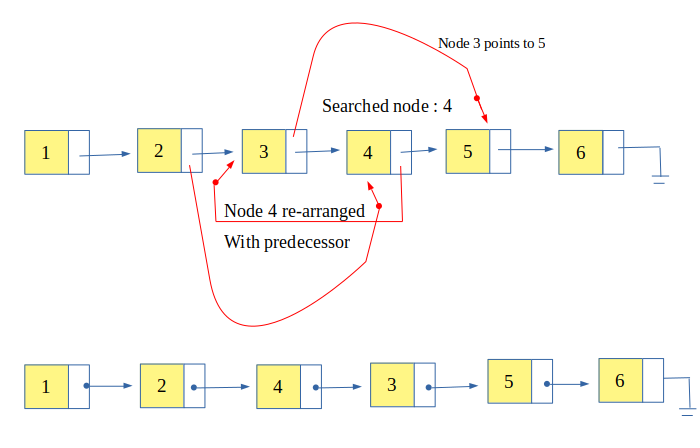自组织列表:转置方法
自组织列表是重新组织或重新排列自身以获得更好性能的列表。在一个简单的列表中,以顺序方式查找要搜索的项目,这给出了 O(n) 的时间复杂度。但在实际场景中,并非所有项目都被频繁搜索,大多数情况下只有少数项目被多次搜索。
因此,自组织列表使用此属性(也称为引用位置)将最常用的项目放在列表的开头。这增加了在列表开头找到项目的可能性,并且那些很少使用的元素被推到列表的后面。
在Transpose Method 中,访问的节点与其前任交换。因此,如果任何节点被访问,它将与它前面的节点交换,除非它是列表中的第一个(头)节点。简单来说,访问节点的优先级缓慢增加,以使其最终到达第一个位置。转置方法与其他方法的主要区别在于,需要多次访问才能将节点带到前面。

例子:
Input : list: 1, 2, 3, 4, 5, 6
searched: 4
Output : list: 1, 2, 4, 3, 5, 6
Input : list: 1, 2, 4, 3, 5, 6
searched: 5
Output : list: 1, 2, 4, 5, 3, 6
Explanation: In 1st case, 4 is swapped with its predecessor i.e. 3
In 2nd case, 5 is swapped with its predecessor i.e. again 3
// CPP Program to implement self-organizing list
// using move to front method
#include
using namespace std;
// structure for self organizing list
struct self_list {
int value;
struct self_list* next;
};
// head and rear pointing to start and end of list resp.
self_list *head = NULL, *rear = NULL;
// function to insert an element
void insert_self_list(int number)
{
// creating a node
self_list* temp = (self_list*)malloc(sizeof(self_list));
// assigning value to the created node;
temp->value = number;
temp->next = NULL;
// first element of list
if (head == NULL)
head = rear = temp;
// rest elements of list
else {
rear->next = temp;
rear = temp;
}
}
// function to search the key in list
// and re-arrange self-organizing list
bool search_self_list(int key)
{
// pointer to current node
self_list* current = head;
// pointer to previous node
self_list* prev = NULL;
// pointer to previous of previous
self_list* prev_prev = NULL;
// searching for the key
while (current != NULL) {
// if key found
if (current->value == key) {
// if key is neither the first element
// and nor the second element
if (prev_prev != NULL) {
/* re-arranging the elements */
prev_prev->next = current;
prev->next = current->next;
current->next = prev;
}
// if key is second element
else if (prev != NULL) {
/* re-arranging the elements */
prev->next = current->next;
current->next = prev;
head = current;
}
return true;
}
prev_prev = prev;
prev = current;
current = current->next;
}
// key not found
return false;
}
// function to display the list
void display()
{
if (head == NULL) {
cout << "List is empty" << endl;
return;
}
// temporary pointer pointing to head
self_list* temp = head;
cout << "List: ";
// sequentially displaying nodes
while (temp != NULL) {
cout << temp->value;
if (temp->next != NULL)
cout << " --> ";
// incrementing node pointer.
temp = temp->next;
}
cout << endl
<< endl;
}
// Driver Code
int main()
{
/* inserting five values */
insert_self_list(1);
insert_self_list(2);
insert_self_list(3);
insert_self_list(4);
insert_self_list(5);
insert_self_list(6);
// Display the list
display();
// search 4 and if found then re-arrange
if (search_self_list(4))
cout << "Searched: 4" << endl;
else
cout << "Not Found: 4" << endl;
// Display the list
display();
// search 2 and if found then re-arrange
if (search_self_list(5))
cout << "Searched: 5" << endl;
else
cout << "Not Found: 5" << endl;
display();
return 0;
}
输出:
List: 1 --> 2 --> 3 --> 4 --> 5 --> 6
Searched: 4
List: 1 --> 2 --> 4 --> 3 --> 5 --> 6
Searched: 5
List: 1 --> 2 --> 4 --> 5 --> 3 --> 6